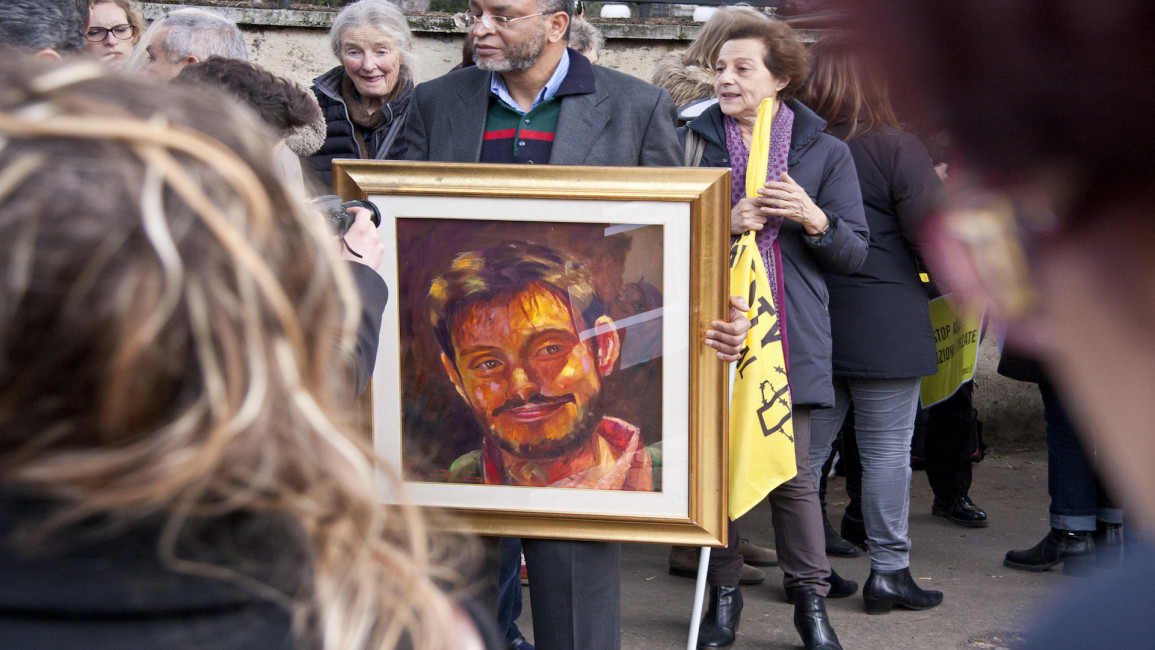Egypt postpones highly anticipated Italy meeting over Giulio Regeni
Egypt has postponed a meeting in Rome, where a Cairo delegation was due to hand over evidence relating to the torture and murder of Italian student Giulio Regeni, The Guardian reported on Monday.
The highly anticipated was scheduled for Tuesday, but is now expected to be held later this week.
On Saturday, Egyptian daily Akhbar el-Yom said that Egypt would hand over to Rome a "comprehensive file" containing results of investigations and surveillance on Regeni "since his arrival in Cairo", which indicates that Egyptian authorities did indeed target the slain researcher.
The file would have also included documents and photos gathered by Egyptian security authorities on meetings by Regeni with workers and trade union representatives, the subject of his Cambridge University doctoral thesis.
Regeni went missing on the evening of 25 January, the fifth anniversary of the 2011 uprising that overthrew veteran strongman Hosni Mubarak.
His mutilated body was found a week later at the side of a road on Cairo's outskirts, suggesting he died at the hands of security services during an interrogation, an allegation the Egyptian government has strongly denied.
The issue has generated criticism of Egyptian President Abdel Fattah al-Sisi both domestically and abroad.
In a press conference at the Italian Senate on Wednesday, Luigi Manconi, president of the human rights commission, said that if Cairo failed to hand over key evidence to their Italian counterparts in the upcoming meeting on 5 April, Italy should consider recalling its ambassador to Egypt for consultation.
Manconi also said that Italy's foreign ministry would have to declare Egypt an "unsafe country", which would undoubtedly have a significant effect on the numbers of tourists there.
Italian tourism in Egypt has already been affected by the repercussions of Regeni's case.
The Italian Association for Responsible Tourism (AITR), which promotes "responsible, sustainable and ethical" tourism, has recently announced the suspension of all activities in Egypt until the truth behind tragic murder of Regeni is clarified.
 |
The naive stories about Regeni's death have hurt Egypt at home and abroad and offered some a justification to judge what is going on in the country now to be no different from what went on before the 25 January revolution. - Mohammed Abdel Hadi Allam |
 |
Domestically, the editor of Egypt's top state newspaper called on authorities on Sunday to deal with the case in a serious manner, warning that saying officials who do not realise the gravity of the case are risking a break in Egyptian-Italian relations.
In a front-page column, al-Ahram's Editor-in-Chief Mohammed Abdel Hadi Allam subtly suggested that Regeni's murder might have the same impact in Egypt as the 2010 beating to death by police of Egyptian youth Khaled Said, whose brutal death helped ignite the 25 January popular uprising.
"The Khaled Said case, despite its circumstances, did not go away like some thought at the time," he warned.
"The naive stories about Regeni's death have hurt Egypt at home and abroad and offered some a justification to judge what is going on in the country now to be no different from what went on before the 25 January revolution."
Last month Egyptian authorities implied that Regeni had been killed by a criminal gang specialising in kidnapping foreigners.
Authorities said all members of the gang had been killed in a shootout and that Regeni's passport and several personal items had been found in the gang leader's home.
The announcement was immediately rejected by Italian media and by Regeni's family, who have publicly stated a belief that Regeni was killed by Egyptian security forces.
Italian Prime Minister Matteo Renzi has insisted Italy will settle for nothing less than the truth.
However, Egyptian authorities insist they are cooperating fully with Italy.


![President Pezeshkian has denounced Israel's attacks on Lebanon [Getty]](/sites/default/files/styles/image_684x385/public/2173482924.jpeg?h=a5f2f23a&itok=q3evVtko)



 Follow the Middle East's top stories in English at The New Arab on Google News
Follow the Middle East's top stories in English at The New Arab on Google News


